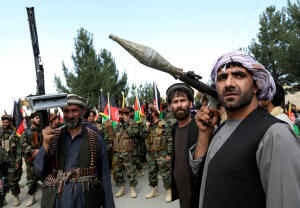Biden meets Afghan leaders as U.S. troops leave, fighting rages
 Send a link to a friend
Send a link to a friend
 [June 25, 2021]
By Jonathan Landay and Steve Holland [June 25, 2021]
By Jonathan Landay and Steve Holland
WASHINGTON (Reuters) - U.S. President Joe
Biden meets Afghan President Ashraf Ghani and his former political foe,
Abdullah Abdullah, on Friday to discuss Washington's support for
Afghanistan as the last U.S. troops pack up after 20 years of war and
government forces struggle to repel Taliban advances.
The Oval Office meeting may be as valuable to Ghani for its symbolism as
for any new U.S. help because it will be seen as affirming Biden's
support for the beleaguered Afghan leader as he confronts Taliban gains,
bombings and assassinations, a surge in COVID-19 cases and political
infighting in Kabul.
"At a time when morale is incredibly shaky and things are going
downhill, anything one can do to help shore up morale and shore up the
government is worth doing," said Ronald Neumann, a former U.S.
ambassador to Kabul. "Inviting Ghani here is a pretty strong sign that
we’re backing him."

Biden's embrace, however, comes only months after U.S. officials were
pressuring Ghani to step aside for a transitional government under a
draft political accord that they floated in a failed gambit to break a
stalemate in peace talks.
Biden's first meeting as president with Ghani and Abdullah, chairman of
the High Council for National Reconciliation, will focus on "our ongoing
commitment to the Afghan people" and security forces, said White House
deputy press secretary Karine Jean-Pierre.
Biden has asked Congress to approve $3.3 billion in security assistance
for Afghanistan next year and is sending 3 million doses of vaccines
there to help it battle COVID-19.
Biden will urge Ghani and Abdullah, foes in Afghanistan's two last
presidential elections, "to be a united front" and he will reaffirm U.S.
support for a negotiated peace deal, Jean-Pierre said.
U.S. officials, however, have been clear that Biden will not halt the
U.S. pullout – likely to be completed by late July or early August – and
he is unlikely to approve any U.S. military support to Kabul to halt the
Taliban's advances beyond advice, intelligence, and aircraft
maintenance.
Ghani and Abdullah spent Thursday discussing the situation in
Afghanistan with lawmakers on Capitol Hill.
WORRIES ABOUT AL QAEDA
The visit comes with the peace process stalled and violence raging as
Afghan security forces fight to stem a Taliban spring offensive that
threatens several provincial capitals and has triggered mobilizations of
ethnic militias to reinforce government troops.
[to top of second column]
|

Armed men attend a gathering to announce their support for
Afghan security forces and that they are ready to fight
against the Taliban, on the outskirts of Kabul, Afghanistan
June 23, 2021. REUTERS/Stringer/File Photo

The crisis has fueled grave concerns that the Taliban
could regain power - two decades after the U.S.-led invasion ended
their harsh version of Islamist rule – allowing a resurgence of al
Qaeda. U.S. and U.N. officials say the extremists maintain close
links with the Taliban.
"The Pentagon and the intelligence community are saying it is very
likely that al Qaeda will come roaring back. It is very likely that
our soldiers and our troops may have to go back into Afghanistan,"
said U.S. Representative Mike Waltz, a former Army officer who
commanded U.S. special forces in Afghanistan.
U.S. officials respond that the United States will be able to detect
and thwart any new threats by al Qaeda or other Islamists. The
Taliban insist al Qaeda is no longer in Afghanistan.
U.S. government sources familiar with U.S. intelligence reporting
describe the situation as dire. Ghani, they said, has been urged to
do more to step up pressure on the insurgents while U.S.-led
coalition forces are still there.
Biden, who pledged to end America's "forever wars," announced in
April that all U.S. forces would be out of Afghanistan by the
anniversary of the Sept. 11, 2001, attacks by al Qaeda on the United
States.

He made the decision even though a 2020 U.S.-Taliban deal forged
under former President Donald Trump set May 1 as the U.S. pullout
deadline.
(Reporting by Jonathan Landay and Steve Holland; Additional
reporting by Patricia Zengerle, Phil Stewart, Idrees Ali and Mark
Hosenball; Editing by Mary Milliken and Daniel Wallis)
[© 2021 Thomson Reuters. All rights
reserved.] Copyright 2021 Reuters. All rights reserved. This material may not be published,
broadcast, rewritten or redistributed.
Thompson Reuters is solely responsible for this content. |